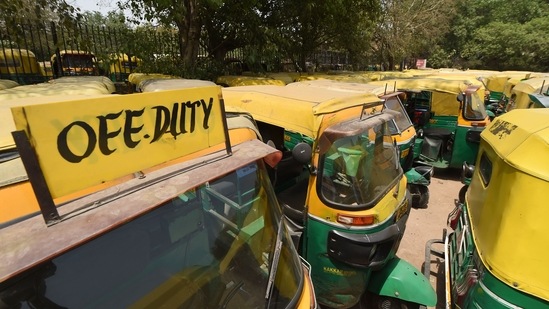Commuters left in the lurch as Delhi’s taxis, autos stay parked
Scores were stranded, especially at the airport and railway stations, as their ride-hailing aggregator services showed no available taxis or autos, forcing most to use the Metro or buses, where possible.
Commuters were in a rough ride on Monday, as most autos and taxis in Delhi and the National Capital Region (NCR) stayed off the roads, in a protest against rising fuel prices.

Scores were stranded, especially at the airport and railway stations, as their ride-hailing aggregator services showed no available taxis or autos, forcing most to use the Metro or buses, where possible.
Even as Delhi’s auto unions said they will resume services from Tuesday, they, along with taxi unions — who are likely to continue to the strike for at least another day — kept up their demand for a subsidy on CNG prices, as well as increased fares.
On Monday, however, commuters said aggregator services charged more than double, even as waiting times for a ride often ticked past 45 minutes.
“Like always, I tried booking an Uber to get to work in Film City, Noida, which is 16km from home. The app presented a fare of ₹1,093. I’m usually charged anywhere between ₹250-280 for my daily office commute. Ultimately, I had to take out my car and drive,” said Aarav Jain, a media professional.
A number of passengers who either had to board a flight or train, or had just arrived in the city were left stumped by the sudden disappearance of app-based cabs.
“I landed at Terminal 3 and could not get any Ola or Uber cabs. A few local taxis were there, but they were charging double or triple the usual rate,” said Milee Sharma, who came to Delhi on a personal trip. The situation was worse at the airports’ terminals 1 and 2, commuters said.
Farhad, who goes by his first name, arrived at the New Delhi Railway Station and failed to get an auto or cab. “After hunting for an hour, I called a friend to pick me up and drop me home. He had to get out of office and help me out,” he said.
A section of auto and cab drivers also sat on a protest near chief minister Arvind Kejriwal’s residence at Civil Lines to press their demands. Small protests were also seen at Kashmere Gate ISBT, Rani Bagh and the New Delhi Railway Station auto stand.
A senior official said that the Delhi government has constituted a fare revision committee and will take a call after the panel submits its recommendations.
The Sarvodaya Driver Association Delhi, which has driver partners engaged with cab aggregators, said the two-day strike may turn into an “indefinite” strike.
“We are giving the (state and central) governments two days’ ultimatum to consider our demands, else our symbolic strike will turn into an indefinite strike. We don’t want to do this but we have no option left,” said Ravi Rathore, a member of the association.
While taxis are likely to be few and far between on Tuesday, residents can expect some relief, with autos scheduled to resume services.
Delhi Auto Rickshaw Sangh General Secretary Rajendra Soni said, “Seeing the hardships faced by people at the airport and at railway stations today, we have decided to call off our strike. Auto-rickshaws in Delhi will resume operations from Tuesday,” he said.




